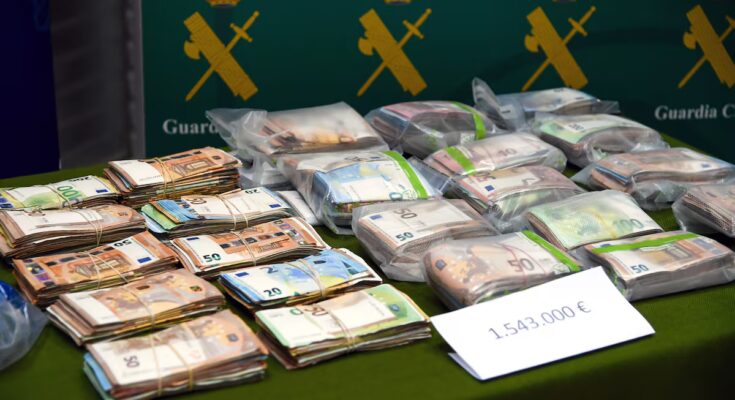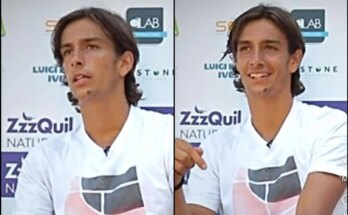On August 9, early in the morning, the leader of the United Tribunes motorcycle gang, Stefan Milojevic, called criminal lawyer Gonzalo Márquez by phone. During the conversation he told him that early in the morning he met the son of the former head of the narcotics group of the Balearic Islands National Police Faustino Nogales and that he confessed to him that his father was worried about the investigations that the police were carrying out into Milojevic’s affairs. “My son told me that he is screwed, that he has started writing on paper so as not to speak”, Milojevic tells the lawyer, who informs him that the police inspector “is worried” about the possible interception of a conversation in which he reveals confidential information.
This sting is part of a report prepared by investigators of the Civil Guard and the National Police, to which EL PAÍS had access and which is included in the summary of Operation Casting Bal-Manso, the secret of which was revealed this week. The investigation led to the intervention of 3,200 kilos of drugs and the arrest of 76 people under investigation for alleged crimes of belonging to a criminal organisation, corruption, money laundering, revealing secrets and crimes against public health.
The criminal organization, made up of Spanish and Albanian citizens, is said to have dedicated itself to the introduction of large quantities of cocaine and hashish by sea and land into the islands of Ibiza and Mallorca. Investigators place Milojevic as the leader of the organization, in charge of directing, coordinating and financing the drug delivery operations, while they point to the lawyer Márquez as the brain, ideologue and decision-making figure in charge of guiding the criminal activity and laundering the economic benefits. Both have been in pre-trial detention since their arrest last August.
In the second row they put the former head of the narcotics gang, also in prison, who they indicate as the person who informed the heads of the investigation network and accelerated the arrest of the main people involved. In one of the conversations between Milojevic and Márquez, both talk about the “extreme” security measures that the police inspector has begun to adopt to avoid being linked to drug traffickers, to whom at a certain point he stops responding: “And Faustino, man, he’s shit… he goes in a taxi, he goes on a motorbike, can’t you see.” For the investigators, the revelation of confidential information by the inspector is evident when Milojevic tells the lawyer: “Faustino told me, that they are looking at Amok”, in reference to the nightclub and the asset investigation which also affects the business network linked to the criminal organisation.
From telephone interceptions it emerges that the policeman began to take precautions to leave no trace of his connections with the network and sent his son again to pass on information to Milojevic. “He sent his son yesterday, to Amok. At 4.30 he called me, I went and said: ‘Hey! Put your cell phone on airplane mode, I don’t know, they come for you, for my brother, for the people of Ibiza,'” Milojevic tells an interlocutor who does not identify himself.
Investigators from the Civil Guard and the National Police believe that these demonstrations confirm that Nogales has learned that the investigations are very advanced, that arrests will take place in the near future, and does not hesitate to send this information to the leader of the international criminal organization. The suspects recognize that, at a certain point, the inspector stops answering the phone: “He doesn’t even answer our calls, messages, he doesn’t want to talk to us.”
Tip
In one of the reports attached to the summary, the investigators underline the “great relevance” of the inspector’s role as a collaborator of the criminal organization, given that Milojevic expressed in numerous telephone conversations his intention to flee the country when he learned that he was under investigation. “I go to Austria and in Austria I take the car and go around,” Milojevic tells one of his collaborators, while telling another that he intends to leave Spain for “three or four months”. The evidence against the inspector is supported by other conversations in which the collaborators ask Milojevic for any information Nogales may have on the investigation, who they also ask to investigate how many people are under police control.
The police investigations and follow-ups conducted for months on the main people involved also consider it relevant that Nogales remained with Carlos Hervás, a leading member of the organization in the second echelon of the structure, who received direct orders from Milojevic and Márquez, and who was responsible for the operational and logistical part. In reality, investigators point out that Nogales used a luxury vehicle owned by Hervás, who opened a vehicle sales shop to launder part of the drug money on the orders of the ringleaders.
Another aspect under scrutiny are the criminal organization’s attempts to recruit members of the National Police, the Civil Guard or people linked to the judiciary or the press to try to bribe them and obtain information on possible investigations to which they could be subjected. Investigators point to Márquez as the ideologue of a plot to overturn the professional career of the chief inspector of the National Police in charge of carrying out the initial investigations into the case. The lawyer tried to implicate the policeman with a drug trafficker from the Son Banya slum, one of the epicentres of drug dealing in Mallorca, to make it appear that he was employed or bribed. According to the investigation, Márquez tried, through Inspector Nogales, to obtain testimonies from other national police officers, as well as the help of the press to disseminate this information.
The functioning of the criminal network is conceived, according to the researchers, in a similar way to that of historical mafias such as the Neapolitan Camorra or the Sicilian Mafia, even if they find greater coincidences with the ‘Ndrangheta. “There is also a direct influence of Stefan’s (Milojevic) Serbian origins, as well as the education he himself acquired in our country,” the report states. And he points out that the “idiosyncrasy” of this peculiar cultural mix gave Milojevic the knowledge and aggression necessary to control a group of people who operate throughout the European continent and whose base of operations is the place where Milojevic himself is located.



